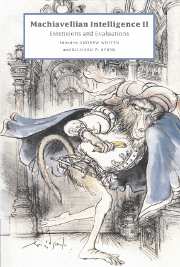Book contents
- Frontmatter
- Contents
- Contributors
- Preface
- 1 Machiavellian intelligence
- 2 Friendships, alliances, reciprocity and repair
- 3 Why Machiavellian intelligence may not be Machiavellian
- 4 Social intelligence and success: Don't be too clever in order to be smart
- 5 Minding the behaviour of deception
- 6 The Machiavellian mindreader
- 7 Exploiting the expertise of others
- 8 Primates' knowledge of their natural habitat: As indicated in foraging
- 9 Evolution of the social brain
- 10 The modulatory of social intelligence
- 11 The Technical Intelligence hypothesis: An additional evolutionary stimulus to intelligence?
- 12 Protean primates: The evolution of adaptive unpredictability in competition and courtship
- 13 Egalitarian behaviour and the evolution of political intelligence
- 14 Social intelligence and language: Another Rubicon
- Index
11 - The Technical Intelligence hypothesis: An additional evolutionary stimulus to intelligence?
Published online by Cambridge University Press: 23 November 2009
- Frontmatter
- Contents
- Contributors
- Preface
- 1 Machiavellian intelligence
- 2 Friendships, alliances, reciprocity and repair
- 3 Why Machiavellian intelligence may not be Machiavellian
- 4 Social intelligence and success: Don't be too clever in order to be smart
- 5 Minding the behaviour of deception
- 6 The Machiavellian mindreader
- 7 Exploiting the expertise of others
- 8 Primates' knowledge of their natural habitat: As indicated in foraging
- 9 Evolution of the social brain
- 10 The modulatory of social intelligence
- 11 The Technical Intelligence hypothesis: An additional evolutionary stimulus to intelligence?
- 12 Protean primates: The evolution of adaptive unpredictability in competition and courtship
- 13 Egalitarian behaviour and the evolution of political intelligence
- 14 Social intelligence and language: Another Rubicon
- Index
Summary
Suppose the Machiavellian intelligence hypothesis is right, and the problems created by social complexity were indeed an important spur to increasing intelligence during primate and human evolution. Do we then need to assume that this effect was operating constantly and universally? Not necessarily. It is perfectly possible that intellectual capacity was increased at several different points in the ancestral line leading to humans, and that these events were caused by evolutionary responses to quite different circumstances. And what of non-primates? Are all signs of specialisation in extra brain capacity to be explained in the same way? Clearly this is rather unlikely.
The question is, which particular observed facts does the Machiavellian intelligence hypothesis explain, if any? On a rather grand interpretation, as perhaps suggested by ‘Social Expertise and the Evolution of Intellect in Monkeys, Apes and Humans’ (the subtitle of Machiavellian Intelligence, Byrne & Whiten, 1988), the need to handle social complexity would be the stimulus to all intellectual advances throughout the evolutionary ancestry of humans and primates. On the most narrow interpretation, the hypothesis would assert only that social complexity lies behind certain specific differences in ability between the haplorhine and strepsirhine primate groups. This more modest claim is already strongly supported by current evidence. What we must do, is first locate the evolutionary events that contributed to the eventual pre-eminence of human intellect. Only then can we tentatively assign causes, in the form of selective pressures that promoted change.
- Type
- Chapter
- Information
- Machiavellian Intelligence IIExtensions and Evaluations, pp. 289 - 311Publisher: Cambridge University PressPrint publication year: 1997
- 103
- Cited by



